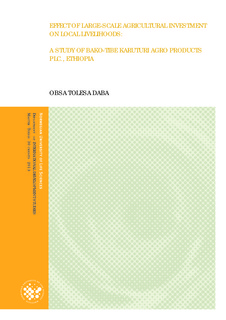| dc.description.abstract | This study examined the effect of a large-scale agricultural investment, namely Bako-Tibe Karuturi Agro Products Plc., on local livelihoods in Ethiopia using quantitative and qualitative analysis. A sample survey of randomly selected 88 households from three kebelles adjacent to the investment and three focus group discussions in each of the kebelles were carried out. Key informant interviews with woreda (district) government officials and qualitative and informal interview with local people were conducted. Available official documents were collected. The study investigated local, socio-economic conditions and rural livelihood imperatives were not taken sufficiently into account when decisions about the investment were taken. The land expropriated for the investment was a ‘rural communal landholding’ vital for communal grazing and forest based economic activities. Parts of the rural communal landholding were used for crop production on individual basis for year with the authorization of local government bodies. Regardless of its use, the communal landholding and parts of it used for crop production were not registered and consequently not eligible for payment of compensation. Stated intentions of the investment included more productive land use, generation of employment and training benefits for the local community and improvement of local social facilities and infrastructures. But the opportunity costs of the investment for the local people seem to be greater than the benefits generated so far. The expropriation of the landholding changed accesses to communal grazing land and water resources for livestock and challenged household irrigation. It has significantly affected forest-based incomes for household consumption and commercial purposes. It affected individual landholdings used for years (but unregistered) and intra-local mobility of the community adjacent to the investment. Though local employment opportunities were created, these consisted of low-paying seasonal jobs and casual labour with no employment security and poor working conditions. Under the current investment agreement and investor’s performance, spillover effects related to improved agricultural production techniques are questionable. Any significant contribution of the investment to local and national food supply seems unlikely. The change of accesses to the local resource base strongly affected local livelihoods options to and income diversification opportunities. Farm income (crop-production and livestock) contributes up to 87% of total household income. The local households are economically poor - mean per capita income is far less than the national average and more than two-thirds reported a mean annual food supply shortage of 1.75 months. As a consequence of expropriation of unregistered individual land holdings, inequality in land and wealth distribution, measured through the GINI index, increased by about 4 and 2 percentage points respectively. | no_NO |
